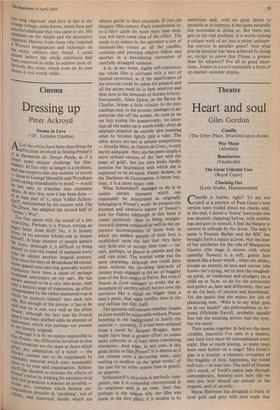Cinema
Dressing up
Peter Ackroyd
Swann in Love ('18', Lumiere Cinema)
All of the critics have been describing the
difficulties involved in filming Proust s
to Recherche du Temps Perdu, as if it Posed some unique challenge for film- Makers. In fact only its length is a problem, and one suspects that any number of novels those of George Meredith and Wyndham Lewis spring immediately to mind — would be less easy to translate into cinematic terms. At any rate, now it has been done or at least part of it, since Volker Schlon- dorff, emboldened by his success with The ,,, Drum, has adapted the second half of Swann's Way'.
The
scratching. film opens with the sound of a pen Perhaps it is Proust writing an angry letter from Hell? No, it is Jeremy Irons in yet another febrile role as Swann himself. A large number of people admire Mr Irons, although it is difficult to bring 1tleself to join the round of applause every „Irne he adopts another languid posture. ver since the days of Brideshead Reinsited, tt h°se spaniel eyes and that generally wistful e, xPression have been a cause of perhaps Irrational annoyance on my part. He has always seemed to be a very thin actor, with only a limited range of expression, an effect w°Mpounded by the rather mannered way in 'r.hich he projects himself into each new ,.°1e. Rut enough of the poison: it has to be Swann, that he is cast very well as the effete although the fact that his French speech has been dubbed adds an element of hollowness which was perhaps not present in the literary original. Although it is by no means impossible to Ira Proust, the difficulties involved in that Lansformation are the same as those which literary feet any adaptation of a novel — the "I.terary content has to be supplanted by cinematic material which stays reasonably close to its tone and organisation. Schlon- dorff has decided to recreate the effects of lr.roust's Prose by treating his narrative in as ,ausb. and grandiose a manner as possible — Itevish sets, costumes which fashion cor- spondents describe as 'ravishing', lots of colour, and historical details which are almost garish in their precision. If you can imagine 19th-century Paris transformed in- to a fairy castle (in more ways than one), you will have some idea of the effect. The result is to induce in the spectator a sort of museum-like trance as all the candles, cushions and precious objects follow one another in a bewildering succession of carefully arranged tableaux.
It is, in any event, highly self-conscious; the whole film is suffused with a sort of hushed reverence, as if the significance of the exercise could be taken for granted and all the actors need do is look sensitive and thus bow to the demands of literary history. Fortunately, Alain Delon, as the Baron de Charlus, brings a little vivacity to the pro- ceedings and, in the process, manages to act everyone else off the screen. As soon as we see him eyeing the manservants, we know that all the make-up is worth while: droit de seigneur acquires an entirely new meaning when he brushes lightly past a valet. The other actors are not in serious competition — Ornella Muti, as Odette de Crecy, is only barely adequate. Here she becomes simply a more refined version of the 'tart with the heart of gold', but her own looks hardly exercise the fascination with which she is supposed to be invested. Fanny Ardant, as the Duchesse de Guermantes, is better but, then, it is a more meaty role. What Schlondorff manages to do is to isolate certain elements which can reasonably be interpreted as originally belonging to Proust's work: he presents the doomed and obsessive nature of Swann's love for Odette (although in this form it comes perilously close to being straight- forward cinema romance) as well as the op- pressive inconsequence of those lives in which the endless pursuit of such love is established upon the fact that they have very little else to occupy their time — ex- cept, perhaps, to glance at carpets and the odd rare print. The brothel scene was the most charming, although one could have done without the revolting spectacle of Jeremy Irons engaged in the act of buggery (one of the first tangos in Paris). But even if Swann in Love manages to evoke the at- mosphere of sterility which hovers over the narrative like a cloud no bigger than a man's penis, that same sterility does in the end suffuse the film itself.
The question still remains whether Swann in Love would be acceptable without Proust hovering in the background to justify the exercise — certainly, if it had been adapted from a novel by Jacques Blogges, there might have been a greater effort to create more coherent or at least more convincing characters. And what, in any case, is this great desire to film Proust? It is almost as if the cinema were a devouring maw, only waiting to swallow up the 'great works' of the past for no other reason than to gratify its appetite.
Schlondorff's direction is perfectly com- petent, but it is somewhat conventional in its emphases and in its tone. And that perhaps is the reason why the film was made in the first place: it is modest in its ambitions and, with no great desire to astonish or to surprise, it has quite naturally not succeeded in doing so. But there one gets to the real problem: is it worth turning a unique work of art into a rather uninspir- ing exercise in another genre? And what precise purpose has been achieved by doing so, except to prove that Proust is greater than his adapters? For all its good inten- tions, Swann in Love is essentially a form of up-market costume drama.










































 Previous page
Previous page